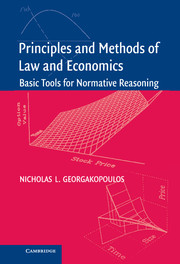Book contents
- Frontmatter
- Contents
- Preface
- INTRODUCTION: INNOVATION IN LEGAL THINKING
- PART 1 PRINCIPLES
- PART 2 METHODS
- 7 MATHEMATICAL MODELING
- 8 CONFRONTING UNCERTAINTY: BASIC PROBABILITY THEORY
- 9 ADVANCED PROBABILITY: DISTRIBUTIONS AS THE SHAPE OF RANDOMNESS
- 10 HOW TO PRICE UNCERTAINTY: FINANCE
- 11 FINANCE AND PROBABILITY: OPTIONS AND DERIVATIVES
- 12 USING SPREADSHEETS
- 13 STATISTICS
- 14 CONCLUSION: IMPORTING METHODOLOGICAL INNOVATIONS
- APPENDIX A MEINHARD V. SALMON 249 N.Y. 458 (1928)
- APPENDIX B GLOSSARY
- APPENDIX C MATHEMATICA NOTEBOOKS
- Index
14 - CONCLUSION: IMPORTING METHODOLOGICAL INNOVATIONS
Published online by Cambridge University Press: 24 July 2009
- Frontmatter
- Contents
- Preface
- INTRODUCTION: INNOVATION IN LEGAL THINKING
- PART 1 PRINCIPLES
- PART 2 METHODS
- 7 MATHEMATICAL MODELING
- 8 CONFRONTING UNCERTAINTY: BASIC PROBABILITY THEORY
- 9 ADVANCED PROBABILITY: DISTRIBUTIONS AS THE SHAPE OF RANDOMNESS
- 10 HOW TO PRICE UNCERTAINTY: FINANCE
- 11 FINANCE AND PROBABILITY: OPTIONS AND DERIVATIVES
- 12 USING SPREADSHEETS
- 13 STATISTICS
- 14 CONCLUSION: IMPORTING METHODOLOGICAL INNOVATIONS
- APPENDIX A MEINHARD V. SALMON 249 N.Y. 458 (1928)
- APPENDIX B GLOSSARY
- APPENDIX C MATHEMATICA NOTEBOOKS
- Index
Summary
Economic analysis of law is an extraordinarily young discipline. The topics for fruitful research form a vast multitude. The array of the traditional methods of economics and the sciences are an enormous resource for the scholar that would be missed if this book had focused on one or two novel methods. Moreover, novel methods do tend to receive enough attention to be thoroughly covered and explained. The reader should be able easily to supplement the gaps in those directions.
A greater and more systemic concern is the failure of some new methods to gain favor in the legal academy. Law, in general, and economic analysis of law, in particular, could and should take advantage of every rigorous new method that the sciences produce. A few legal scholars have engaged the methods of fractals, evolutionary theory, and cellular automata with some success. The legal academy, however, seems almost indifferent to those methods. Because the discipline's success requires the ability to broaden the palette of tools for analysis, it is important to assimilate new methods even when they do not have wide applicability.
As an exercise of our own ability to adopt new methods, this book will close with a very brief discussion of cellular automata, fractals, and evolutionary theory.
CELLULAR AUTOMATA
Some problems in physics proved intractable for the traditional methods without being fundamentally complex. Some have surrendered answers when scholars approached them by using a remarkably simple tool, cellular automata.
- Type
- Chapter
- Information
- Principles and Methods of Law and EconomicsEnhancing Normative Analysis, pp. 315 - 322Publisher: Cambridge University PressPrint publication year: 2005



